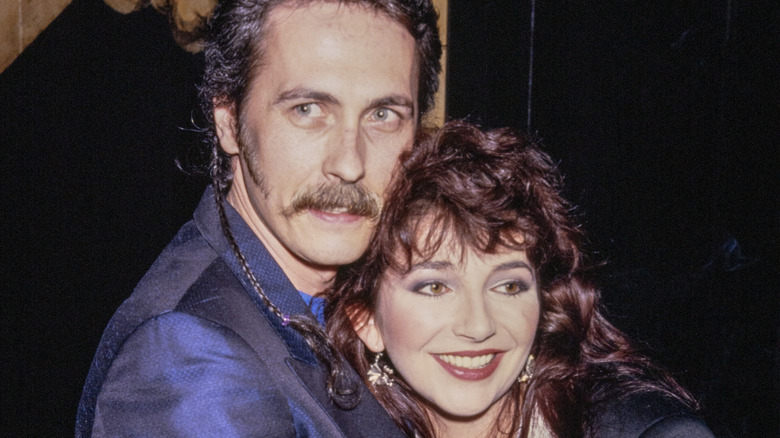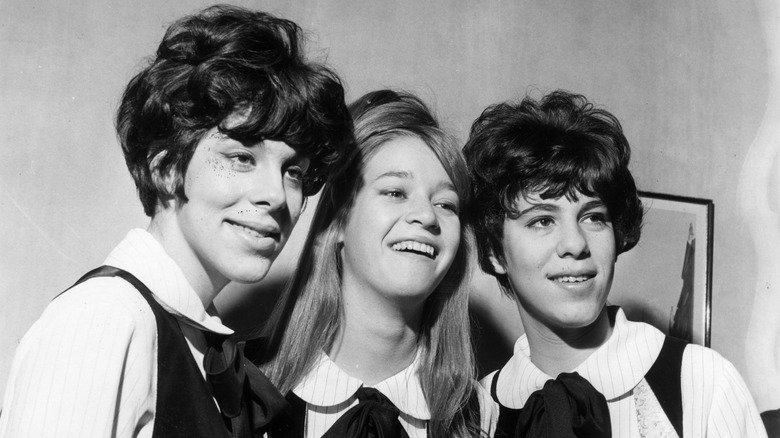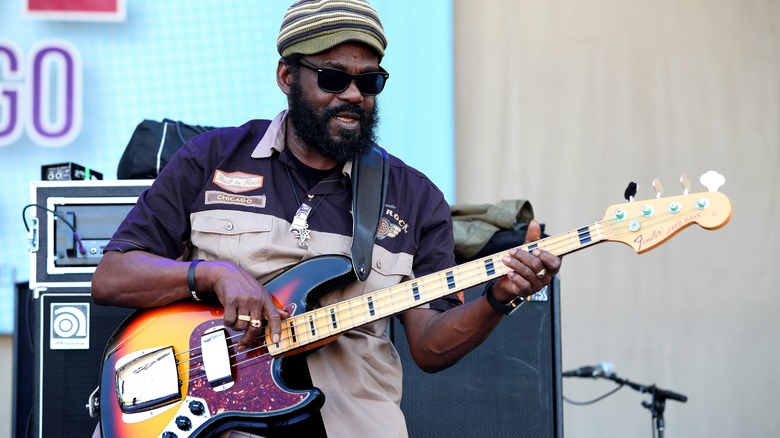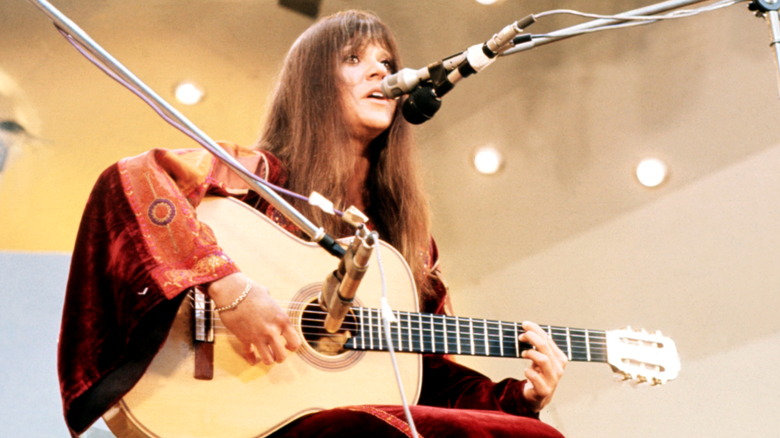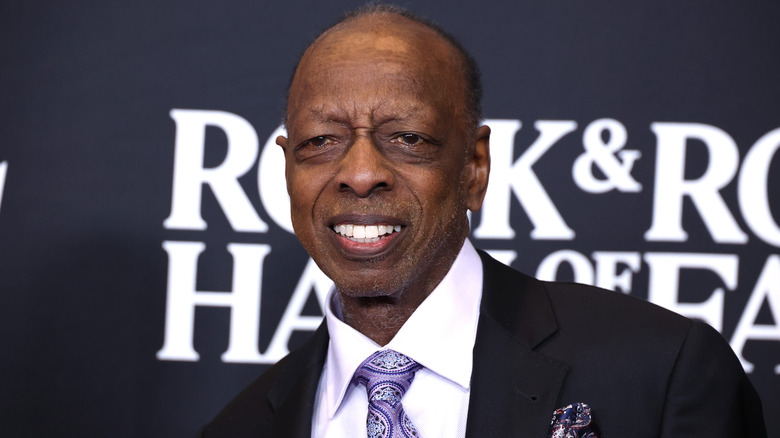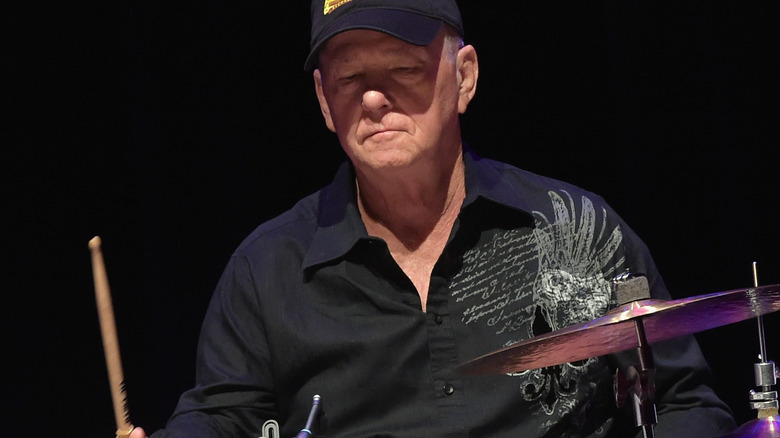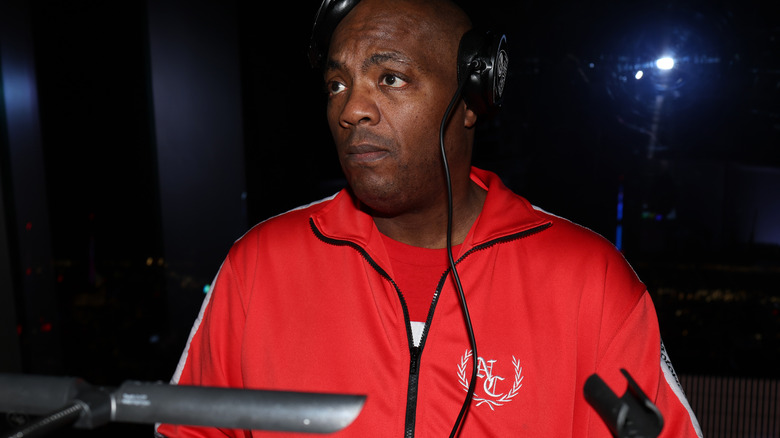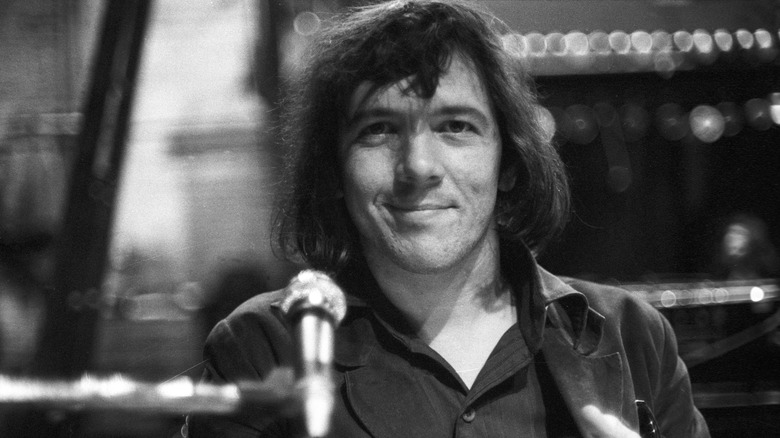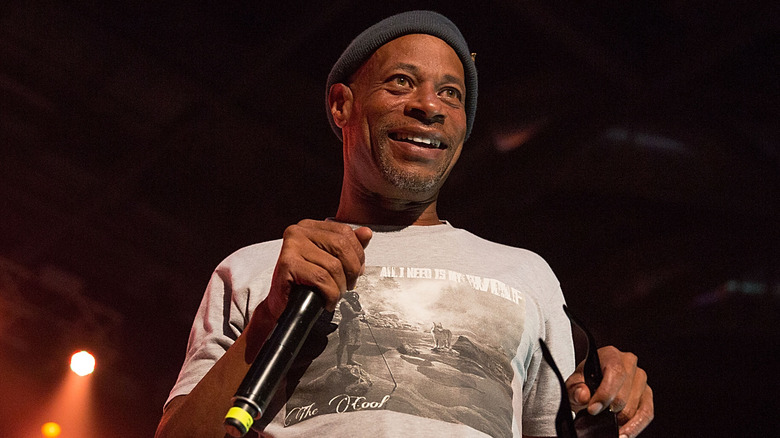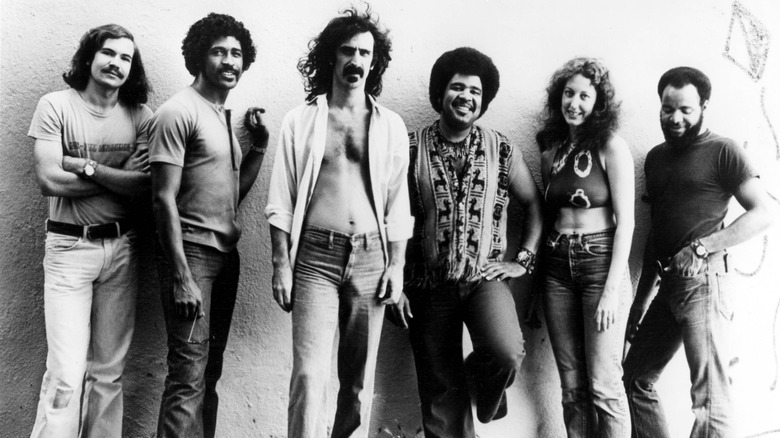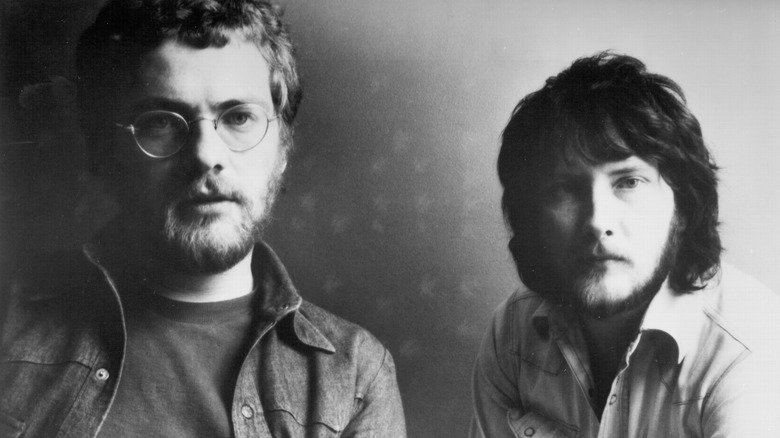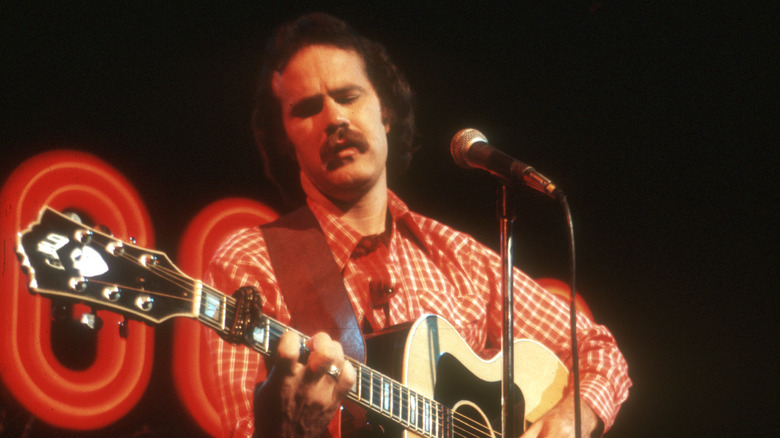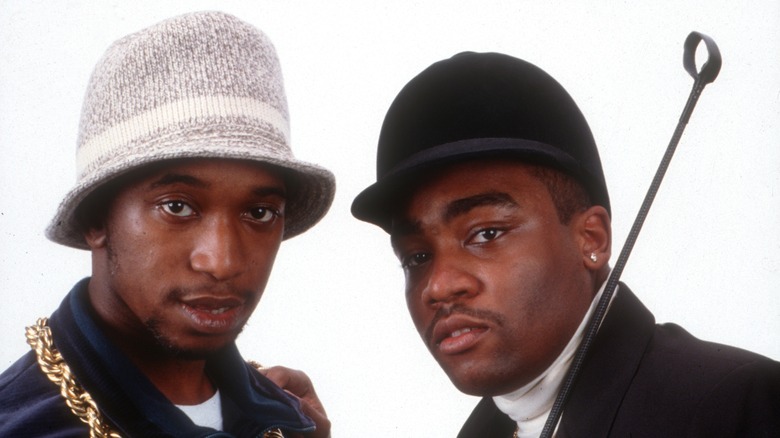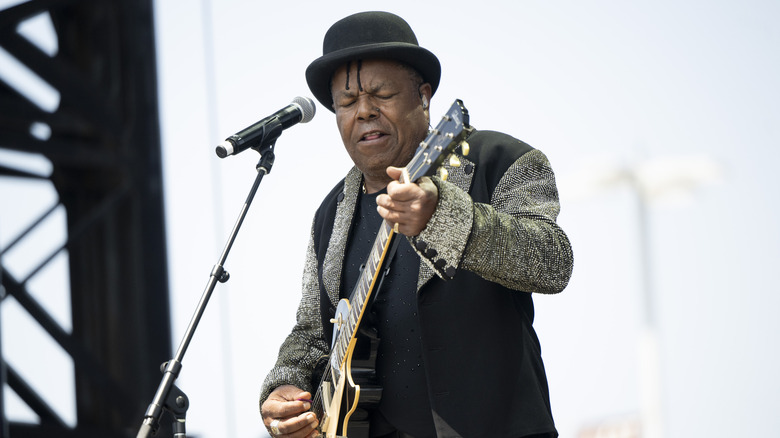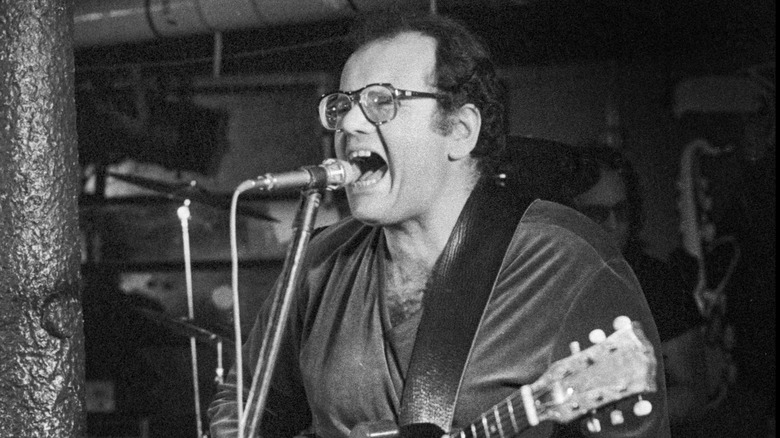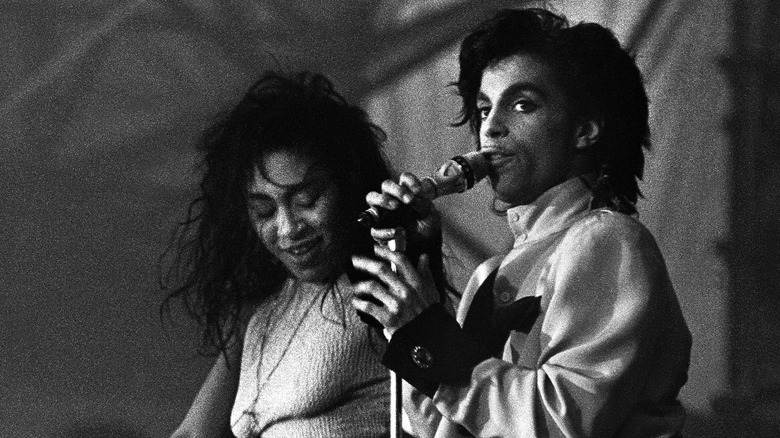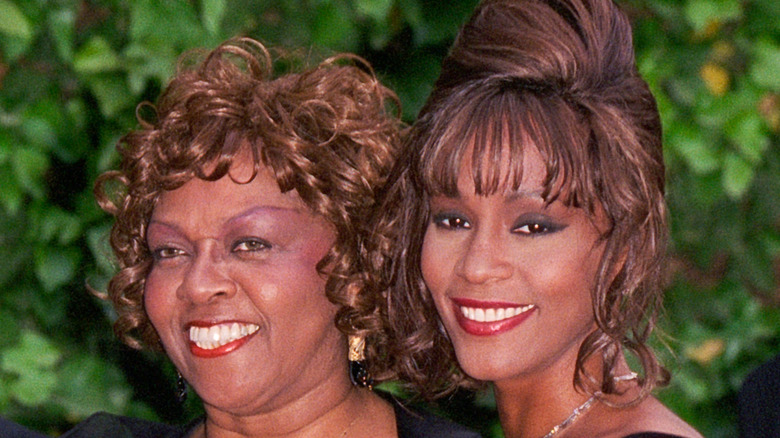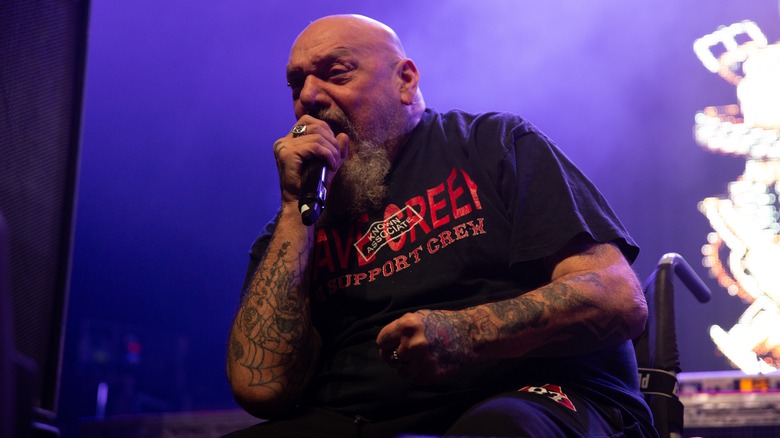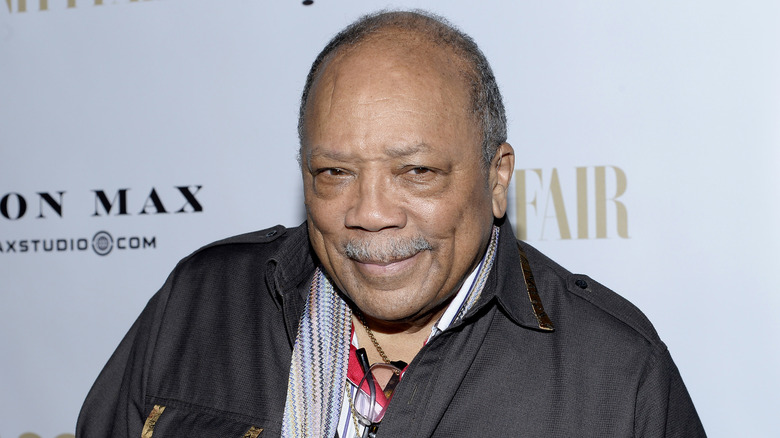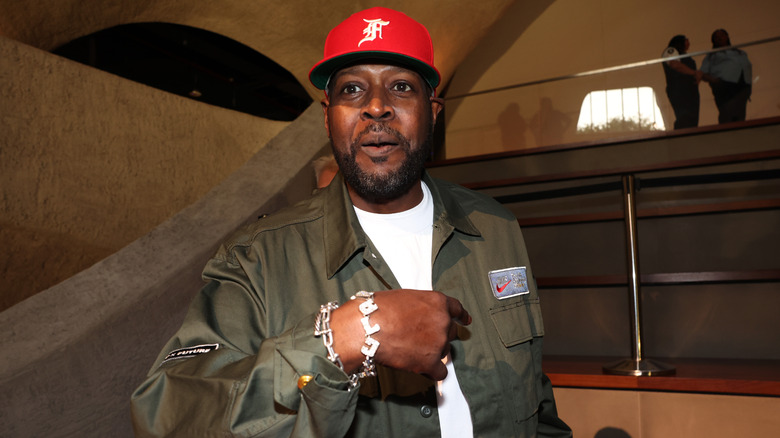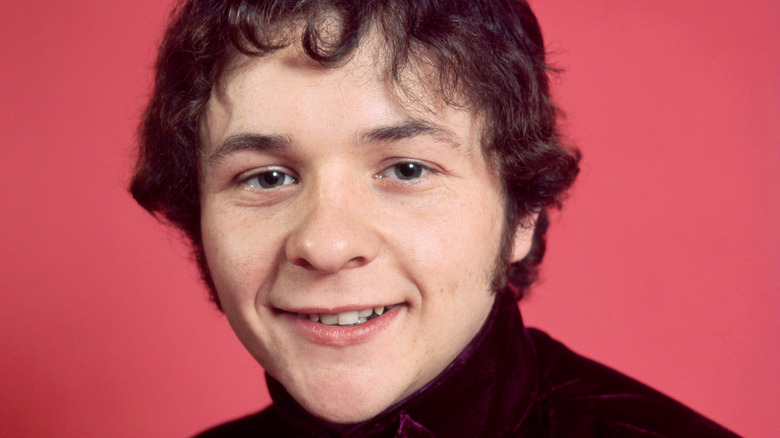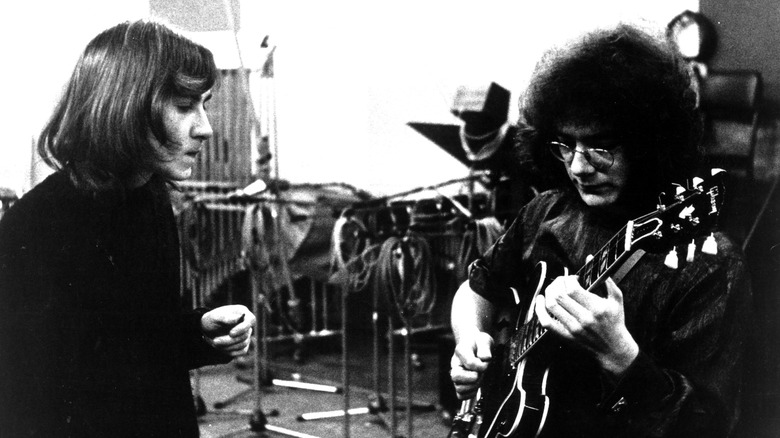Musicians Who Died In 2024
Every year, the world of music brings us joy and pain in equal measure. For every new release from a beloved artist that blows our minds, another beloved artist will leave the music business forever; for every amazing concert we're able to see, there will be one that sells out before we even know tickets are on sale; for every long-awaited, highly anticipated project that really turns our cranks, another will let us down. Most tragically of all, for every new artist who bursts onto the scene, another will shuffle off this mortal coil for all time.
As musicians themselves have reminded us since time immemorial, everybody dies, and that blows. When those musicians inevitably pass on, though, it can be the ultimate double-edged sword. Their music may live on forever, but it can leave an empty space inside their fans knowing that it's all they're ever going to get — and even for those artists who have been out of the scene for years, there will be heartache for those fans who made their artistic expression a part of their lives. Here are the musicians who have left us in 2024.
David Soul
David Soul achieved his greatest level of fame as an actor; he is, of course, the man who played the handsome and hip Ken "Hutch" Hutchinson on the iconic '70s cop series "Starsky & Hutch." If he hadn't made it as an actor, though, he had a couple of other avenues to fame; he turned down an entreaty from the Chicago White Sox to come and play some baseball for them, opting instead to attend college in Mexico. Upon his return, he fashioned himself as a folk singer, playing Mexican tunes in coffee houses, and he even managed to get on the bill opening for such legends as Frank Zappa, the Lovin' Spoonful, and the Byrds.
His music career didn't really take off until he rose to fame on television, however — and when it took off, it did so with a vengeance. In 1976, he released his debut album, a self-titled affair that yielded the No. 1 hit single "Don't Give Up on Us," placing Soul on the elist list of famous actors who scored Top Ten pop hits. A talented writer and singer, Soul dropped four more albums and toured the world with his backing band, although his later work didn't enjoy the success of that monster debut. Soul continued to appear on the stage and screen throughout the '90s and '00s; his last feature appearance was in the James McAvoy-starring "Filth" in 2013. He passed away on January 4 from natural causes; he was 80 years old.
Larry Collins
Larry Collins shot to fame in the '50s as half of the duo the Collins Kids with his sister Lorrie; he was only 9 years old when the pair became regulars on the country variety series "Town Hall Party," and while 11-year-old Lorrie was ostensibly the star of their act as the vocalist, it was guitar prodigy Larry who was known to wow audiences. A livewire bundle of energy, he bopped around the stage slinging hot licks with his double-necked guitar, which had been gifted to him by his mentor, "King of the Strings" Joe Maphis. So energetic was Collins' style that the punk rock website Please Kill Me credits him with recording the first punk record, "Whistle Bait," as a 13-year-old in 1958. (For a fascinating dive into music history, read Grunge's roundup of other artists who helped invent punk.)
A songwriter and composer as well, Collins' best-known tune is "Delta Dawn," which he co-wrote with songwriting partner Alex Harvey; the song became a signature tune for Tanya Tucker, notched a No. 1 hit for Helen Reddy, and was covered by the likes of Bette Midler and Waylon Jennings. After the Collins Kids disbanded in 1965, Collins semi-retired from the stage, although he got together with his sister to perform again on a few occasions; Lorrie passed away in 2018, and on January 5, her brother followed her. He was 79 years old.
Del Palmer
A bassist, guitarist, and self-taught recording engineer, Del Palmer deployed his talents on records by the likes of Roy Harper, Midge Ure, and Doors guitarist Robby Krieger — but by far, the most sizable chunk of his discography was devoted to the work of Kate Bush, one of the most idiosyncratic and beloved recording artists of all time. It was he who (again, using skills he taught himself) engineered Bush's 1985 album "Hounds of Love," which yielded the single "Running Up That Hill (A Deal with God)," which — thanks to its prominent placement in the fourth season of "Stranger Things" in 2022 — improbably raced up the charts that summer, entering the Top 10 in 34 countries and earning Bush a tidy sum in streaming revenue.
A gifted bassist and songwriter, Palmer even released a solo album, "Leap of Faith," in 2007 — but he saved most of his best work for Bush, with whom he was also romantically linked for a time. He played bass, sat behind the boards, or both for Bush for over a quarter-century, working on every one of her albums from "Lionheart" in 1978 until "50 Words for Snow" in 2011. On January 5, Palmer passed away from undisclosed causes at the age of 71, and Bush was quick to eulogize her friend on her website. "He was a big part of my life and my work for many years," she wrote. "It's going to take a long time to come to terms with him not being here with us ... I'm going to miss him terribly."
James Kottak
The consummate rock drummer, James Kottak came up on the Louisville, Kentucky, scene, playing drums in local bands as a teenager. Upon moving to Los Angeles, his skills got him gigs pretty quickly; he latched on with Kingdom Come, playing on their first two albums, and briefly joined hard rock legends The Cult. Soon, though, he found his home — as a member of the Scorpions, one of the most successful, hard-rockingest bands to ever come out of Germany. Kottak became the first American to join their ranks in 1996, and he played with the band for two decades, departing in 2016 due to alcohol-related issues.
Kottak had struggled with those issues for years; in 2014, he spent a month in jail for Dubai for drinking without a license and allegedly making derogatory remarks toward Muslims (which he denied). After his sentence was completed, he said, he vowed to "stop drinking once and for all" — but, while it is not known whether he ever achieved the sobriety he sought, it's likely that the rock and roll lifestyle was a drag on Kottak's health. On January 9, the Scorpions announced via Facebook that the drummer had passed away at the age of 61. "James was a wonderful human being, a great musician and loving family man," the band's statement read. "He was our 'Brother from another Mother' and will be truly missed ... Rock 'n Roll Forever RIP James."
Luis Vasquez
Post-punk act the Soft Moon was every bit as dangerous, aggressive, and hardcore as its name suggested it was not, and it was the brainchild of vocalist and multi-instrumentalist Luis Vasquez, its only constant member and sole creative force. Vasquez had made no secret of the fact that his childhood, spent primarily in East Los Angeles and a village in the Mojave desert, was a rough one; in an interview with Metal magazine, he said, "We were poor and my family was pretty violent. I grew up in bad neighborhoods, so I was exposed to a lot of dark realities ... that's why my music sounds the way it does." Indeed, Vasquez' hard-edged tracks, while at times oddly beautiful, could be the stuff nightmares are made of — which is why they have often shown up in violent or disturbing scenes in TV series such as "Mr. Robot," "How to Get Away with Murder," and "American Horror Story."
Vasquez spent time living and recording in Venice, Berlin, and Joshua Tree, California, before returning to LA in 2023, and it was there that he met his untimely end. On January 21, it was reported by the Los Angeles Times that the previous week, Vasquez had been found dead of an apparent fentanyl overdose along with DJ and producer John "Silent Servant" Mendez and his partner, visual artist Simone Ling; he was only 44 years old.
Mary Weiss
The Shangri-Las were part of a wave of girl groups that took the pop charts by storm in the '60s, and they made their mark largely on the strength of the skills of producer Shadow Morton — who gave their tunes a dramatic, cinematic sound — and the vocals of lead singer Mary Weiss (pictured above, center), whose emotion-drenched, borderline operatic style was a perfect fit for the group's teen anthems. In just a couple of years between 1964 and 1966, they scored four Top 20 hits — and one immortal classic, the No. 1 smash "Leader of the Pack."
Despite being only 15 when the song reached the top of the chart, Weiss projected a bad-girl image quite unlike her girl group peers, and she and her group would later be cited as an influence by the likes of Amy Winehouse and the Ramones. Of her unpolished yet dramatically expressive vocal style, Morton once said that he required her to be "an actress, not just a singer" (via Billboard), a task that she handled admirably well, particularly at such a young age. The Shangri-Las last performed together in 1989, and Weiss went to work for an architecture firm, finding time to release a solitary solo effort, "Dangerous Game," in 2007. On January 19, Weiss passed away due to obstructive pulmonary disease; she was 75 years old.
Toby Keith
Toby Keith was the very definition of a rough-and-tumble, take-no-crap country singer; although he rose to fame in the '90s, his aesthetic was much more reminiscent of the likes of Merle Haggard and Waylon Jennings than peers like Garth Brooks. As a teenager in Oklahoma, he worked as a rodeo hand and in the oil fields, plying his musical trade in the local honky tonks. He managed to get a demo tape to Alabama producer Harold Shedd, who got Keith into the studio to record his debut, self-titled 1993 album. That record, featuring hit singles like "Should've Been a Cowboy" and "A Little Less Talk and a Lot More Action," went double-platinum — but that was just the beginning of his success.
Rejecting the efforts of his label, Mercury, to push him in a poppy direction, Keith bolted for DreamWorks Records in 1999. There, his first three albums with the label sold a combined 10 million copies. Keith's politics, which he did not shy away from publicly embracing, kept him in the headlines; a public dust-up with the Chicks and controversy over his post-9/11 single "Courtesy of the Red, White and Blue (The Angry American)" did nothing to damage his well-earned image as a straight-shooting symbol of the working class. Keith announced in 2022 that he had been diagnosed with stomach cancer, and on February 5, 2024, it was announced on his website that he had passed away at the age of 62.
Aston Barrett
When reggae music began to emerge on the international scene in the late '60s and early '70s, it was defined in large part by its rhythm section — booming, syncopated drums and the bass guitar beats capable of rattling windows and shaking the walls of the clubs and dancehalls where its popularity exploded. That sonic signature came about when legendary artist and producer Lee "Scratch" Perry decided to loan out the rhythm section of his studio's house band, bassist Aston Barrett and his brother Carlton on drums, to an up-and-coming new band: Bob Marley and the Wailers.
Aston Barrett, known by his nickname "Family Man," became the bandleader of the iconic unit and remained with the band throughout its many lineup changes and jump to Island Records in the '70s. After Bob Marley's death in 1981, Barrett continued on, working with the likes of Burning Spear, Alpha Blondy, and Bob Marley's wife, vocalist Rita Marley. In a 2023 Guitar World interview, Barrett described his approach to his instrument in terms that should bring a smile to the face of any bassist: "I call it the Earth Sound," he said. "Reggae music is the heartbeat of the people ... So the bass have to be heavy and the drums have to be steady." On February 3, Barrett's son shared via social media that his father had passed away while hospitalized for an undisclosed illness; he was 77.
Wayne Kramer
Founded in Detroit in 1964, the MC5 (or "Motor City Five") were, at the time, a rock band unlike nearly any other. Only their Detroit brethren the Stooges, led by the famously iconoclastic Iggy Pop, compared to the band's wildly aggressive, ultra-loud, anti-authoritarian proto-punk. At the center was the twin guitar attack of Fred "Sonic" Smith and Wayne Kramer, whose innovative implementation of feedback and distortion during the band's early years squeezed some of its more pop-minded members. During the late '60s, the band positioned itself as the radical arm of the peace movement; its incendiary, profanity-laden live shows (featuring Kramer rocking an ironically star-spangled Fender Stratocaster) became the stuff of Detroit legend. After three albums between two labels, though, the band flamed out, disbanding after a New Year's gig in 1972.
Its influence, though, persisted. The MC5 would be credited as a strong influence on the development of punk, with bands like the Ramones, Sex Pistols, and the Clash following in their anarchic wake. Kramer periodically reconvened the band over the years, and in 2022, he announced the MC5's first new album in over 50 years, dropping a single featuring Rage Against the Machine's Tom Morello. Unfortunately, this project may now be in limbo; on February 2, Kramer passed away from complications of pancreatic cancer. On Instagram, he was eulogized by Morello, who wrote, "Brother Wayne Kramer was the best man I've ever known. He possessed a one of a kind mixture of deep wisdom [and] profound compassion ... the MC5 basically invented punk rock music."
Melanie
Vocalist Melanie Safka, known professionally simply as Melanie, began her career as a struggling singer-songwriter in the late '60s, paying her dues in small venues and releasing two unsuccessful singles for Columbia Records. Then, in 1969, everything began to change for the singer: She hooked up with a new manager and dropped her debut album, "Born to Be," and in August that year, she found herself taking the stage at Woodstock. Inspired by that experience, she released "Lay Down (Candles in the Rain)" in 1970, a tune that became her first Top 10 single. She quickly followed this up with more successful singles, and by the summer of 1971, she was riding high on the success of the ultra-catchy, whimsical single "Brand New Key" — her first U.S. No. 1.
In an interview, Melanie would later recall of the somewhat controversial hit, "It was a time when people were reading things into lyrics. Some said it was sexual innuendo ... I was just having a romp through my memory of learning how to ride my bike and roller skating," (via The New York Times). While she never again topped the charts, Melanie continued to record and perform well into her later years, maintaining a complicated relationship with the tune that made her household name; speaking with Where Music Meets the Soul, she lamented that "Brand New Key" was "the song that doomed me to be cute for the rest of my life." On January 23, her children confirmed via Facebook that Melanie had passed away from undisclosed causes the day prior; she was 76.
Henry Fambrough
The legacy of Detroit R&B group the Spinners is secure as, somewhat ironically, one of the first outfits to help define the sound of Philly Soul. The group had a few minor hits with Motown in the late '60s and early '70s, but their career took off after a move to Atlantic in 1972; the decade saw them notch major hits with tunes like "It's a Shame," "Rubberband Man," and "Working My Way Back to You." Key to their sound were intricate harmonies, anchored by lead vocalist Philippe Wynne on the top end and the booming baritone of Henry Fambrough on the bottom. In the decade from 1972 to 1982, the band notched seven Top 10 hits and six Grammy nominations.
Of course, time took its toll on the group, and as of 2013, Fambrough was leading the way as the only surviving original member. He didn't seem much interested in slowing down; in 2021, the Spinners released their first studio album in decades, "Round the Block and Back Again." Fambrough saw his group inducted into the Rock & Roll Hall of Fame in 2023, and in February 2024, he passed away at the age of 85. At his memorial in the Motor City, he was remembered not just as a musical icon, but as a man of unimpeachable integrity and character, not to mention a top-notch cook. ""The world knew him for his voice," said fellow Spinner Jessie Peck, "but his family and friends knew him for his heart" (via Detroit Free Press).
Jimmy Van Eaton
James "Jimmy" Van Eaton may not be a household name, but without him, early rock and roll may have sounded a lot different. As a teenager in Memphis in the '50s, he first played the trumpet before taking up the drums; his first band, the Echoes, happened to cut their first demo at the world famous Sun Records, whose proprietor Sam Phillips had an unerring ear for artists who were propelling the new genre forward. His driving style of playing caught that ear, and Phillips first paired the drummer up with vocalist Billy Lee Riley before introducing him to another artist with the same middle name: legendary piano-pounder Jerry Lee Lewis, who enlisted Van Eaton to play on his seminal recordings.
Van Eaton was soon one of a handful of musician entrusted by Phillips to help mold the label's signature sound, and he went on to play with such legends as Roy Orbison, Johnny Cash, and Carl Mann, to name just a few. He retired from the music business in the '80s in favor of a quieter life selling municipal bonds, but he briefly came out of retirement a time or two — to contribute his indelible style of drumming to the soundtrack for the Lewis biopic "Great Balls of Fire," and to release a solo album, "The Beat Goes On," in 1998. Van Eaton passed away on February 9, at the age of 86.
Cat Janice
The story of Cat Janice could be the stuff of Hollywood melodrama; if only it actually were. Janice, a talented singer-songwriter with a unique sound that blended EDM grooves with a rock sensibility, seemed to be on the precipice of breaking through to the mainstream when, in 2022, she was diagnosed with a rare form of cancer. She responded to the turn of events the only way she knew how: by writing music. In 2023, she released the resulting album, "Modern Medicine" — but later that year, she got the news that the cancer had spread to a lung, and her prognosis was not good.
Even more tragically, Janice knew that she would be leaving behind the loves of her life — her husband, Kyle Higginbotham, and her 7-year-old son, Loren. Janice entered into hospice care in January 2024, and just a few days later, she released the song that would sadly serve as both her introduction the world at large, and as her swan song: "Dance You Outta My Head," which caught fire after fans on social media learned of her health outlook. Janice shared that all of the songs' streaming proceeds would go to Loren, and thanks in part to signal boosting by the likes of Jason DeRulo and Charli D'Amelio, the tune went viral online and cracked the Billboard dance charts. Janice passed away on February 28, and Higginbotham told The New York Times the one thing he wanted to know about his wife: "Cat's a real-deal artist," he said, "and [she] poured every minute of her life into it, right up until the end."
Lichelle Boss Laws
In the early '90s in Los Angeles and throughout much of the U.S., gangsta rap was a hot commodity — and in that world, Lichelle "Bo$$" Laws was a bit of an outlier. Laws was born and raised in Detroit, and by all accounts had a very comfortable middle-class upbringing; she would later tell the Los Angeles Times, however, that all of the family outings and ballet classes just weren't really her speed. "I didn't start living till I got out of that proper s***," she said. "That's when the real me got out of the cage."
The real Laws liked to spit profane, rugged, hardcore rhymes that could match any of her male peers, with a level of skill that outshone a good many of them. Her startlingly on-point delivery earned her the attention of legendary mogul Russell "Rush" Simmons, who promptly signed her to his Def Jam West label; Laws dropped her debut album, "Born Gangstaz," in 1993, moving north of 400,000 copies. Laws was widely respected in the rap community, but unfortunately, she found herself dogged by health problems in later years; in 2011, she was diagnosed with renal disease, and she suffered a stroke in 2017. She never fully recovered, and on March 11, Laws passed away in the hospital at the age of 54. She was mourned on Instagram by a slew of fellow rappers including UGK legend Bun B, who wrote, "Rest in peace to my big sis Lichelle Laws AKA Boss. One of the best female MCs and a dear friend."
Eric Carmen
As the lead singer for the Raspberries, Eric Carmen helped to establish the genre of power pop in the early '70s; his clear, bright vocals and earworm-y melodies were a unique complement to the band's heavy sound. It was as a solo artist later in the decade, though, that Carmen really made his mark. In 1975, he released his debut, self-titled solo album, which yielded one big hit single — "Never Gonna Fall in Love Again," which peaked at No. 11 — and one absolutely massive one, the No. 2 smash "All by Myself."
Carmen continued dropping albums throughout the late '70s and early '80s, but never managed to duplicate that early success — until he was tapped to provide a single for the soundtrack to a 1987 film about a young girl who falls for a dance instructor at a Catskills resort, a film nobody really expected to do much. Of course, "Dirty Dancing" became a cultural phenomenon, and Carmen's tune, "Hungry Eyes," raced all the way up the chart to No. 4; his follow-up single, "Make Me Lose Control," peaked one slot higher at No. 3 the following year. Carmen essentially disappeared from the music industry after a final album, "Winter Dreams," in 1998, but his legacy as a power-pop powerhouse is more than secure. In March, his wife Amy announced that he had died peacefully in his sleep at the age of 74, writing on his website, "It brought him great joy to know, that for decades, his music touched so many and will be his lasting legacy" (via Chicago Sun-Times).
Dickey Betts
The Allman Brothers Band has undergone its fair share of lineup changes since its formation in 1969, but lead guitarist Dickey Betts — whose virtuosic interplay with fellow lead axeman Duane Allman set a template for many, many guitar-rock bands to follow — was a mainstay of the outfit for over three decades. After famously and tragically losing Duane Allman and bassist Berry Oakley to eerily similar motorcycle accidents in 1971 and 1972, Betts and lead singer and keyboardist Gregg Allman anchored the band throughout the rest of the decade and into the '80s. While their live shows were the stuff of legend, they achieved only limited chart success, notching just three Top 40 hits over their career — the most successful of which, the iconic No. 2 smash "Ramblin' Man," was written and sung by Betts.
A freakishly talented guitarist, Betts more than held his own with the Allmans, a trio whose insanely complex guitar-and-keys jammings were known to hold their concert audiences spellbound. While Betts was let go from the band in 2000 (due to "creative differences," although his well-publicized issues with drugs and alcohol may have played a part), he will forever be a part of the Allman Brothers legacy. In recent years, he had continued to perform with his own outfit, the Dickey Betts Band. On April 18, Betts passed away at his home in Florida; he was 80 years old.
If you or anyone you know needs help with addiction issues, help is available. Visit the Substance Abuse and Mental Health Services Administration website or contact SAMHSA's National Helpline at 1-800-662-HELP (4357).
Chris Cross
British outfit Ultravox were not exactly the top-selling band of the '80s; their lone charting U.S. single, "Reap the Wild Wind," stalled out at No. 71. They were, however, a towering influence on their peers, crafting the kind of lovelorn, synth-heavy tunes that would influence a legion of New Wave bands in their wake. The band enjoyed a bit more commercial success in their native U.K., where they scored a No. 2 smash with "Vienna" in 1981 — a tune co-written by bassist Christopher Allen, known to fans by the whimsical moniker of Chris Cross.
Cross was a founding member of the band when it was still known as Tiger Lily in the early '70s, and his rock-steady bass anchored the unit throughout their decade-plus run, which arguably peaked with their well-received set at the legendary 1985 benefit concert Live Aid (an event which the band's lead singer, Midge Ure, helped to organize). Ure was the first to eloquently eulogize Cross when he passed away in March at the age of 71; "We were instant friends as well as Ultravox comrades," he wrote on his Facebook page. "You were the glue that held the band together. You were the logic in the madness and the madness in our lives. It was great to know and grow with you. You are loved and missed old friend."
Michael Ward
Guitarist Michael Ward broke into the music industry with a short-lived project that seemed destined for more success than it actually achieved: the indie rock band School of Fish, whose 1991 single "3 Strange Days" garnered enough airplay to send it into the upper reaches of Billboard's Mainstream Rock Tracks chart. The tune shoved the band briefly into the limelight, but when their sophomore effort failed to make a splash, they disbanded. Ward, though, was not without a gig for long — in the mid-'90s, he joined Jakob Dylan's Wallflowers for their second LP, "Bringing Down the Horse," a No. 4 success that scored the band a Grammy for the single "One Headlight."
Ward contributed to the outfit's 2000 LP "Breach," another Top 20 effort, before departing in 2001. He continued to perform and record with the likes of John Hiatt, Gogol Bordello, Ben Harper, Avril Lavigne, and many others; his distinctive sound is featured on dozens of recordings spanning three decades. Unfortunately, diabetes slowed the guitarist down in recent years, and on April 2, his sister Tracy Ward Hartfiel announced on her Facebook that he had died at the age of 57 from complications of the disease (via NME). The Wallflowers posted a poignant tribute on the band's Facebook, writing, "Michael's role and talents will forever remain a crucial part of the band's history. His contributions to music began before his time with the Wallflowers and continued long after his time with the band ... Much love to his family and his two children."
Keith LeBlanc
Back in the very early days of rap music, the genre's formative recordings were laid down using recreations of popular breakbeats, or hot tunes of the day; the seminal Sugarhill Gang tune "Rapper's Delight," for example, features a near-perfect reproduction of Chic's "Good Times." Since samplers weren't really a thing yet, though, these recreations had to be performed by actual musicians — and none were better at that than Sugarhill Records' in-house band, anchored by legendary drummer Keith LeBlanc. Along with bassist Doug Wimbish and guitarist Skip McDonald, LeBlanc put down the tracks for a slew of the label's hit recordings, including many for Rock and Roll Hall of Famers Grandmaster Flash and the Furious Five.
LeBlanc went on to session work with a laundry list of iconic artists; his crack drumming can be heard on recordings by the likes of Annie Lennox, the Rolling Stones, Peter Gabriel, Stone Roses, and The Cure, and his work with the experimental groups Tackhead and Little Axe in the '80s and '90s was highly influential on the burgeoning industrial and electronica scenes. (LeBlanc is even credited as a producer and engineer on Nine Inch Nails' explosive 1989 debut "Pretty Hate Machine.") LeBlanc passed away on April 4 after an illness; he was 69. Producer Adrian Sherwood, who worked with LeBlanc, Wimbish, and McDonald in Tackhead, eulogized his friend in a statement (via Billboard). "Keith was a major, major talent," he wrote. "We enjoyed some of the most creative times together that shaped my musical life. Thank you Brother Keith."
C.J. Snare
Pop-rock outfit Firehouse enjoyed their greatest success with their first release: their 1991 self-titled effort yielded a No. 5 hit single, "Love of a Lifetime," and landed another, "Don't Treat Me Bad," inside the Top 20. That LP peaked just outside the Top 20 and went platinum, with their follow-up, 1992's "Hold Your Fire," performing similarly well. The band was anchored since their inception by lead singer C.J. Snare, whose immediately recognizable vocal stylings kept Firehouse consistently popular (especially in Japan) after that early peak. After planned abdominal surgery last year, Snare appeared on the road to recovery, and was ready to hit the road with his band once again this summer; in late March, he posted on Instagram that he would "be back on stage with Firehouse before you know it" (via The Hollywood Reporter).
Unfortunately, that was not to be. Not even two weeks later, on April 7, Firehouse announced on their Facebook page that Snare had suddenly passed away at his home; he was only 64. "We are all in complete shock with CJ's untimely passing," the post read. "CJ was arguably one of the best vocal talents of a generation ... You will be forever missed by family, friends, fans and your band mates. You're singing with the angels now."
Calvin LeBrun, aka Mister Cee
DJ Calvin "Mister Cee" LeBrun was a New York legend, and not just because his skills behind the turntables could be heard across the five boroughs seemingly forever; his shows on iconic radio station Hot 97 and WXBK "The Block" were as much a mainstay of the Big Apple as excellent pizza. His contributions to the world of rap music, though, are formidable; he is strongly associated with not one, but two MC's widely regarded to be among the greatest of all time. He served as the DJ for the insanely influential Antonio "Big Daddy Kane" Hardy on the rap legend's debut album, and is credited with discovering Brooklyn icon Christopher "Notorious B.I.G." Wallace.
In recent years, LeBrun had brought his penchant for creating dope mixes to an even larger audience as the host of the "Set It Off Show" (named after a classic Big Daddy Kane tune) on SiriusXM's Rock the Bells Radio channel. On April 10, it was reported by Hot 97 that LeBrun had unexpectedly passed on; he was just 57. The hip hop community reacted with shock and sadness; on X (formerly Twitter), the equally iconic DJ Premier wrote, "Damn! Endless memories ... rest peacefully to The Finisher ... Love you bro," while Public Enemy's Chuck D simply wrote, "Rest In Beats my man. A good dude to the fullest."
Duane Eddy
When it comes to true pioneers of rock and roll, there is perhaps just one name that stands alongside Chuck Berry: Duane Eddy, who alongside Berry was among the very first to popularize the use of the electric guitar in the then-budding genre during the '50s. Not only that, he was the first to play the instrument with his own distinct sound — a growling, reverb-drenched twang that came to be the defining characteristic of the subgenre known as surf rock.
Just how much of a legend was Eddy? His first Billboard Hot 100 appearance was on the first ever Billboard Hot 100, which posted on August 4, 1958. He notched two top-10 rock hits — "Rebel Rouser" and "Forty Miles of Bad Road" — before the '50s were even out; by the end of 1963, he had scored an astonishing 15 top-40 hits, all of them instrumentals. His iconic theme to the classic TV series "Peter Gunn" also landed him a Grammy award.
In March 2024, just months before his death on April 30 at the age of 86, he scored his first No. 1 hit on the Rock Digital Song Sales chart as a credited artist on Dire Straits front man Mark Knopfler's Guitar Heroes "Going Home (Theme from Local Hero)." His signature twang and mastery of his instrument didn't just inspire generations of artists, it inspired the entire genre of rock; in a statement, his representative said (via Variety), "He was the first rock and roll guitar god, a truly humble and incredible human being. He will be sorely missed."
Richard Tandy
The brainchild of front man and songwriter Jeff Lynne, the Electric Light Orchestra (or "ELO") tore off a remarkable string of hits in the '70s and '80s, with smash tunes like "Hold On Tight," "Don't Bring Me Down," and "Mr. Blue Sky" becoming modern standards. Much of their success was due to longtime keyboardist Richard Tandy, whose synthscapes helped to give the band its unique sound — one that, while heavily and obviously influenced by the Beatles, went in directions that even that legendary band never explored. John Lennon himself once said of ELO (via Far Out), "It's a nice group. I call them Son of Beatles, although they're doing things that we never did, obviously."
Originally the band's bassist, Tandy switched to keys early in ELO's run, and it was a fortuitous switch. Perhaps his greatest work came on the 1981 concept album "Time," on which his keys evoked everything from gentle, twinkling raindrops ("Rain is Falling") to rollicking pianos ("Hold On Tight") to futuristic craziness that virtually no bands this side of Devo were even approaching ("Yours Truly, 2095").
Tandy's death in April at the age of 76 was announced on X (formerly Twitter) by Lynne, who wrote, "It is with great sadness that I share the news of the passing of my long-time collaborator and dear friend Richard Tandy. He was a remarkable musician & friend and I'll cherish the lifetime of memories we had together."
Steve Albini
When musician and producer Steve Albini died on May 7 at the age of 61, the coolness quotient of the entire world went down a notch. As a member of grimy underground bands Shellac and Big Black, Albini was a prominent figure in the world of underground rock since the early '80s — but as a producer (although he himself preferred the term "engineer"), his status went far beyond "prominent" and into the realm of "towering."
Albini sat behind the boards for dozens of albums by bands both crazily obscure and truly iconic; albums he produced for the likes of Helmet, the Pixies, Bush, and PJ Harvey are uniformly standouts in the discographies of their respective artists. One album in particular, though, may be his defining work: "In Utero," Nirvana's final studio album, which he produced after the band sought him out.
Albini's proposal letter to the band, in which he extensively outlined his flexible, band-friendly creative process and flatly refused to accept any royalties, went viral in the wake of his death. Another of his legendary writings, the 1993 industry-skewering essay "The Problem with Music," should be required reading for anyone hoping to enter the music business. Albini's untimely death at such a relatively young age was due to a heart attack, and while it's safe to say that his legacy is more than secure, it's also certain that the music world will sorely miss his singular talent.
Dennis Thompson
In February 2024, following the death of guitarist Wayne Kramer, Detroit proto-punk outfit the MC5 was officially down to one surviving member: drummer Dennis Thompson, whose powerful style helped to define the band's sound. As Thompson explained to the Detroit Free Press in 2003, though, it wasn't his drumming that drove the band to ever-greater peaks of loudness — rather, it was the other way around.
In their early days of playing parties, he said that the band's tendency to crank their amps threatened to drown him out; "Wayne was always telling me, 'Dennis, you need to play harder and stronger,'" he said. "The drums weren't miked, but the amps were cranked on 10 ... So I started hitting them harder and harder. I had to play as powerfully as I could to break through that wall of sound."
Thompson had suffered a heart attack in April, but appeared to be on the road to recovery, and was looking forward to the MC5's impending Rock Hall of Fame induction in October. Becky Tyner, widow of MC5 singer Rob Tyner, said, "Dennis was thrilled with [the honor], so excited and happy." Unfortunately, that was not to be. He never fully bounced back from his cardiac episode, and he died in a Detroit hospital on May 9, at the age of 75.
Charlie Colin
The rock band Train had a pretty good run from the late '90s to the late aughts, and for much of that run, their rhythm section was anchored by bassist and founding member Charlie Colin. His nimble bass work could be heard on the band's first three albums, including their sophomore effort, the one that made them a household name: "Drops of Jupiter," with its No. 5 charting, Grammy-winning title track.
Colin had been friends with the band's guitarist, Rob Hotchkiss, since they were middle schoolers. After departing Train in 2003 to deal with substance misuse issues, he continued to play with his old friend in an outfit called Painbirds, and also lent his talents to Slipknot, Puddle of Mudd, and others.
Colin had been living in Belgium, and according to TMZ, he had been housesitting for a friend in May when he suffered a fatal slip and fall in the shower; he was only 58. The band posted a heartfelt tribute to their fallen founder on Instagram, writing, "He was THE sweetest guy and what a handsome chap ... His unique bass playing and beautiful guitar work helped get folks to notice us in SF and beyond ... You're a legend, Charlie. Go charm the pants off those angels."
Doug Ingle
Iron Butterfly's "In-A-Gadda-Da-Vida" was one of the defining anthems of the '60s, and would have been titled "In the Garden of Eden" had singer Doug Ingle — who had reputedly consumed a gallon of wine — been capable of articulating that phrase at the time it was recorded. Likewise, according to legend, the song was never intended to be a 17-minute epic — it became so because the band was waiting around for the producer while recording it, and just kept on playing until he arrived.
The tune, of course, has gone on to be an immortal piece of the '60s pop culture lexicon, but the band themselves did not have the same amount of staying power; they had broken up by 1971. According to the Los Angeles Times, Ingle spent time managing an RV park and painting houses after his retreat from the limelight, though Iron Butterfly briefly reconvened in the mid-'90s. At that time, Ingle lamented to the Times that his lack of business savvy had contributed to the group's demise: "I didn't involve myself at the business level at all. I just went out and performed," he said. "It was, 'Isn't life great?' Then everything crashed down."
On May 25, Ingle's son reported on Facebook that he had died peacefully at home; he was 78.
Mark 'Brother Marquis' Ross
Perhaps the pre-eminent vocalist of golden age rap outfit 2 Live Crew, Mark "Brother Marquis" Ross was certainly the most capable rapper in a group that didn't exactly place a premium on lyrical prowess, and didn't need to. He featured on Ice-T's iconic tune "99 Problems," and appeared on cuts by the likes of 69 Boyz and King B; he also released a solo effort, "Bottom Boi Style," in 2003.
Formed in California but associated most strongly with their adopted home state of Florida, 2 Live Crew were known primarily for two things: being the most visible artists to carry the banner of the Miami Bass movement of the late '80s and early '90s, and being so over-the-top sexually explicit and vulgar that they became the first act to have an album, their 1989 effort "As Nasty as They Wanna Be," declared obscene by a federal judge. While this did not stick, it did constitute a notable low point in the government's war on explicit lyrics during that time period — one which still didn't prevent the album's lead single, "Me So Horny," from becoming a No. 26 pop hit.
In June, it was announced via the group's Instagram account (via TMZ) that Ross had died from unknown causes; he was only 57.
Tom Fowler
The late, great Frank Zappa was a bonafide musical genius; his skill as a composer earned him comparisons to Mozart, and as such, his music was not exactly intended for mass consumption. His band, the Mothers of Invention, was likewise staffed with formidable musicians capable of keeping up, and bassist Tom Fowler (pictured far left) was no exception.
The story behind his hiring is illustrative of Zappa's tendency to live up to his first name, as Fowler explained in a 2000 interview with T'Mershi Duween. "I guess he got sick of looking for a bass player," he said. "The audition was very simple. He had me play a couple of odd muted things and groove for a while, and then he said, 'OK, you're it.' That was a really good band."
It probably helped that Zappa had been one of Fowler's influences to take up the bass in the first place, and his sharp musicianship earned him plenty of work after playing for the Mothers between 1973 and 1978. In addition to his solo work and recording with his family band Air Pocket, Fowler manned the bass for such legends as Steve Hackett, George Duke, and Ray Charles, and it's mostly his bass parts you hear during the musical numbers in the Oscar-winning 2004 biopic "Ray." In July, his friend Arthur Barrow announced via Facebook that Fowler had died; he had experienced complications from an aneurysm he had the previous week. He was 73.
Joe Egan
Like many talented acts of the '70s, the folk-rock duo Stealers Wheel may have been a mere footnote in popular music history if not for one massive, immortal hit. Formed by singer-songwriters Gerry Rafferty and Joe Egan in 1972, the group endured a slew of personnel changes, mismanagement, and internal strife, and lasted only three years and three albums before disbanding.
Their self-titled debut, though, yielded the top ten hit for which they will forever be known: "Stuck in the Middle With You," a cultural touchstone which has since appeared in a metric ton of TV shows and movies (including, infamously, a harrowing scene in Quentin Tarantino's feature debut "Reservoir Dogs"). The pair co-wrote and shared lead vocal on the tune, which peaked at No. 6 on the U.S. chart in 1973.
While Rafferty went on to some solo success with late '70s hits like "Baker Street" and "Right Down the Line," Egan (pictured right) failed to find chart success on his own. The pair stayed in touch during the decades after their brush with stardom, though; Rafferty died in 2011, and in July, it was his daughter Martha who announced Egan's death at 77 via Facebook. "Very sad news that the other half of Stealers Wheel, Joe Egan, passed away peacefully yesterday afternoon with his nearest and dearest around him," she wrote. "I will always remember him as a sweet and gentle soul. May he rest in peace."
Joe Bonsall
For a brief period in the '70s and early '80s, country artists such as Kenny Rogers, Eddie Rabbitt, and Dolly Parton experienced significant crossover success. One of the more popular groups to ride this wave was the Oak Ridge Boys, a four-piece vocal group that by that time had been around longer than many of their casual fans likely realized. The Boys were formed all the way back in the '40s, shuffling members and disbanding numerous times before settling on a lineup in 1973, one anchored by tenor vocalist Joe Bonsall.
Along with Duane Allen, William Lee Golden, and Richard Sterban, Bonsall helped to propel the decades-old group to superstardom; he sang lead on their biggest crossover hits, "Elvira" (a No.5 hit in 1981) and "Bobbie Sue" (No. 12 in 1982). The Boys also scored 17 No. 1 country hits, notched five Grammys, and in 2015, they were finally inducted into the Country Music Hall of Fame; that year, in a sitdown with Smashing Interviews magazine, Bonsall reflected on his group's success. "I think the Oak Ridge Boys have always been very good at not letting the big highs get to us too much and not letting the lows get to us too much," he said. "We've always been able to stay on that even keel and keep our perspective."
Bonsall retired from touring in 2022, and in July, it was announced that he had died of the illness commonly known as Lou Gehrig's disease; he was 76.
Dave Loggins
Folk singer-songwriter Dave Loggins, a second cousin to '70s and '80s pop powerhouse Kenny Loggins, amassed a respectable portfolio without even counting his work as a performer. As a songwriter, he penned hit after hit for the likes of Alabama, Tanya Tucker, Toby Keith, Kenny Rogers, and Juice Newton, many of which went to No. 1 on the Country charts; he was the only unsigned artist in the history of the Country Music Awards to take home a statue, and he even wrote "Augusta," the iconic theme for the Masters golf tournament.
The Nashville Songwriters' Association named him 1987's Songwriter of the Year, and inducted him into its Hall of Fame in 1995 — but if you know of him at all, it's probably for a song so endearing and enduring that it could be considered a modern standard.
This would be "Please Come to Boston," a folk-rock tune which tells the story of a "ramblin' boy" who can't seem to settle down in one town, and whose love keeps imploring him to come on home; the song hit No. 1 on the Easy Listening Chart, and peaked at No. 5 on the Billboard Hot 100 in 1974. In recent years, Loggins' career had cooled, but he was still known to give interviews; in 2021, he credited his signature song to divine inspiration, telling podcaster Judy Rodman that he'd written it with chords he'd "never even played before." Loggins died in July while in hospice care; he was 76.
Duke Fakir
The Four Tops have been in the music business for over 70 years — an absolutely mind-blowing span for a popular music act. As of 2024, though, that run has sadly come to an end. In July, Abdul "Duke" Fakir, the tenor for the legendary vocal group and the last surviving original member, died at the age of 88. Fakir had kept the fires burning for the Rock and Roll Hall of Fame inductees and prolific Motown era hitmakers into the modern age; employing replacement members, he was performing under the Four Tops name up until late 2023. He had officially retired earlier this year, and unfortunately, his retirement was as short as his career was long.
The Tops' towering influence on popular music can't be overstated; a list of their hits reads like a book of American soul standards, including such classics as "Ain't No Woman (Like the One I Got)," "It's the Same Old Song," "Baby I Need Your Loving," and the No. 1 hits "Reach Out I'll Be There" and "I Can't Help Myself (Sugar Pie Honey Bunch)."
In 2009, just a year after the death of his last original bandmate, Fakir was handed a Grammy Lifetime Achievement Award, an honor which somehow eluded the Tops for their entire careers. Speaking with the Times Herald-Record on the occasion, he said, "To me, [it's] greater than one Grammy, two or three. It says for your life ... you've done well." Indeed, he did.
John Mayall
In the mid to late '60s, Britain produced a slew of talented young blues-inspired guitarists who would go on to change the face of rock — and the common thread among them was John Mayall, an American blues evangelist whose friendship, mentorship, and influence rubbed off on a ridiculous number of future icons. Mayall and his band, the Bluesbreakers, never took the charts by storm; in fact, their lone charting stateside hit, "Don't Waste My Time," peaked at No. 81 in 1969. But his fan base was nothing if not dedicated, and over the decades, Mayall recorded over 70 albums.
Early in Mayall's career, though, he kept having to replace guitarists who departed to embark upon legendary careers. His first protege was some guy named Eric Clapton; members of the Bluesbreakers went on to found such bands as Fleetwood Mac (Peter Green), Cream (Jack Bruce, with Clapton), and the Rolling Stones (Mick Taylor). Mayall dabbled in jazz fusion in the '70s before reconvening the Bluesbreakers in the '80s, often with his famous former pupils sitting in for live performances.
A tireless writer and constant tinkerer, Mayall was endlessly shuffling his band's lineup and recording new material up until very recently; his final studio album, "The Sun is Shining Down," was released in 2022. In July, it was announced via his Facebook page that Mayall had died at his home in California after an illness; he was 90 years old.
Thomas DJ Polo Pough
During the dawn of the Golden Age of Rap in the late '80s, there were a handful of lyricists — notably Kris "KRS-One" Parker, William "Rakim" Griffin, and Antonio "Big Daddy Kane" Hardy — who pushed the art of rapping forward by leaps and bounds, both lyrically and technically. Perhaps the most unheralded of these was Juice Crew member Nathaniel "Kool G Rap" Wilson — an MC who, despite having a lisp, brought a tongue-twisting style full of brain-bending metaphors and vivid imagery, and exhibited a level of breath control best described as "extraterrestrial." Wilson's partner in crime: Thomas "DJ Polo" Pough, who produced tracks and manned the decks for three albums with Wilson as a duo, all of them bona fide classics.
In a conversation with Rolling Stone, Wilson shared that he owed his career to Pough, who introduced him to Juice Crew impresario Marley Marl to launch his career. He added that after their three albums together, the pair had simply grown apart, but had often reunited for shows in the intervening years; in the year or so leading up to the Covid pandemic, Pough had been dealing with health issues, and Wilson recalled being shocked that after his last visit, with Pough, his friend simply "never came home out the hospital."
Pough died in July at the age of 63, and Wilson remembered him as one of the "realest, [most] down-to-earth, humblest and funniest dudes a person could ever know."
Derek Chino XL Barbosa
Derek "Chino XL" Barbosa was not known as the "King of Punchlines" for nothing. The quick-witted, nimble-tongued MC carved out a respectable career in rap, dropping four solo albums beginning with his acclaimed debut, "Here to Save You All," in 1996. He was perhaps best-known, though, for his guest appearances — and it speaks to the quality of his work that virtually everybody in the business clamored to get him onto one of their tracks. His list of credits over the last two-plus decades reads like a who's-who of prominent MCs; Chino appeared on tracks by the likes of Saafir, Canibus, R.A. the Rugged Man, Ghostface Killah, Tech N9ne, Immortal Technique, and others.
Barbosa died unexpectedly in July at the age of 50, having just completed his final guest appearance on Rakim's comeback album "G.O.D.'s Network — Reb7rth." His family passed on the news to his devastated fans via Instagram, in a post that included a touching statement from his five children. "Our father filled our lives with lessons and so much love. We are incredibly proud of who he was, of all that he achieved, of his huge heart and of all he shared with the world," it read in part. "The indelible mark he leaves on hip hop and the love and support he exchanged with countless friends and fans are what we hope to be the cornerstone of his legacy."
Jack Russell
In a less-tragic world, rockers Great White would be best-remembered for their 1989 single "Once Bitten Twice Shy," which peaked at No. 5 in the summer of 1989; led by vocalist Jack Russell, the band scored several more Hot 100 hits in the late '80s and early '90s. Unfortunately, though, fate conspired to hand them a different legacy. In 2003, Russell and a revamped version of the band were performing at a small Rhode Island nightclub when a fire broke out, caused by the band's own pyrotechnics. One hundred people, including the band's guitarist, perished in the blaze, and tour manager Daniel Biechele was ultimately handed a four-year prison sentence.
The incident took a toll on Russell, who shared what he could of his experience with Larry King for CNN in 2005. "There is not a day that goes by that you don't think about that," he said. "The therapy is ongoing ... the emotional pain I'm going to go through the rest of my life."
Russell continued to record and perform, but in July, he announced his retirement after being diagnosed with Lewy Body dementia, a degenerative and incurable condition. The following month, his family announced his death via Instagram; he was 63. "Jack is loved and remembered for his sense of humor, exceptional zest for life, and unshakeable contribution to rock and roll," the post read in part. "His legacy will forever thrive."
Greg Kihn
Greg Kihn may not be a household name — unless, that is, your household left its television permanently tuned to MTV in the '80s. The Greg Kihn Band arrived at just the right time for the fledgling cable network; they had achieved a No. 15 hit in 1981 with the classic "The Breakup Song (They Don't Write 'Em)," and in 1983, just as MTV was really getting rolling, they dropped their fifth studio album "Kihnspiracy." (Most of the band's album titles were Kihn-related puns.) That album's lead single, "Jeopardy," was a swaggering slab of funk-rock that rocketed up the charts thanks to its memorably creepy, action-packed video; the tune peaked at No. 2 that year.
While the band never matched that success, that pair of hits became immortal, and both receive healthy play on classic rock radio to this day. During his era, Kihn earned a reputation for being unafraid to play straight-ahead rock during a time when New Wave was king. He was also known for his sense of humor — he was the only artist to explicitly endorse the "Weird Al" Yankovic parody of his signature tune, the brilliant "I Lost On Jeopardy," by making a winking cameo in Al's video.
Later in life, he continued to perform while embarking on runs as a radio DJ and a thriller novelist — but unfortunately, even a life packed full of awesome achievements must come to a close. Kihn died from complications of Alzheimer's disease in August; he was 75.
Tito Jackson
Toriano "Tito" Jackson was, of course, pop music royalty — a founding member of the legendary Jackson 5, and the older brother of Michael Jackson, the King of Pop. A bluesman at heart, Tito's distinctive guitar and backing vocals anchored the band during its tenure at Epic Records (the label that discovered the Jacksons and catapulted them to stardom, Motown, wouldn't let them play instruments, instead insisting upon using studio musicians). A strong songwriter and capable lead and backing vocalist, Tito struck out on his own after the Jacksons disbanded in the late '80s, playing the blues in his own band and encouraging the musical aspirations of his three sons, Taj, Taryll, and TJ.
Jackson released a pair of solo albums, 2016's "Tito Time" and 2021's "Under Your Spell," relatively late in life, enlisting the services of guest performers such as George Benson, Stevie Wonder, and Big Daddy Kane. Recently, the Rock and Roll Hall of Famer had been performing at festivals with his brothers Jackie and Marlon — but unfortunately, his late resurgence came to an end in September. After a heart attack at a New Mexico shopping center, Jackson was taken to the hospital, where he died; he was 70 years old.
J.D. Souther
Singer-songwriter JD Souther may have only had one significant hit as a solo artist — "You're Only Lonely," which peaked at No. 7 in 1979 — but it was a friendship he formed with a fellow musician early in his career that would define him as an artist. In late '60s Los Angeles, Souther met singer and guitarist Glenn Frey — and while hanging out at L.A. club the Troubadour, they honed their songwriting craft. Frey was soon to become a founding member of the Eagles, and Souther helped to fill out the band's stable of originals with smartly written tunes.
It was a skill he soon became renowned for, and the artists Souther worked with when songwriting are far too numerous to list — icons like Linda Ronstadt, Bonnie Raitt, Crosby, Stills, and Nash, Warren Zevon, and Burt Bacharach have all enlisted his services, and to the Eagles he contributed such gems as "Heartache Tonight," "New Kid In Town," and "Victim of Love."
When Souther was inducted into the Songwriters Hall of Fame in 2013, he was called "a principal architect of the Southern California sound and a major influence on a generation of songwriters" (via NPR). In September, Souther died at the age of 78, and he was movingly eulogized on the Eagles' official website. "We have lost a brother, a friend and a brilliant collaborator, and the world has lost a great songwriter," the band's statement read in part. "Adios, old friend. Travel well."
Nick Gravenites
Singer, songwriter, and composer Nick Gravenites is not exactly a household name, unless yours is a household well-schooled in '60s blues and blues-rock. The son of Greek immigrants raised on the South side of Chicago, Gravenites picked up the guitar in college and quickly fell in love with the blues, by way of his acquaintances with such legends as Muddy Waters, Charlie Musselwhite, and Howlin' Wolf. After relocating to the Bay Area to get in on the exploding music scene, he formed the band The Electric Flag, an outfit with a short shelf life but which cast a long shadow. Its melding of blues with rock and roll proved to have a profound influence on the likes of Big Brother and the Holding Company as well as Quicksilver Messenger Service, just two of many iconic artists for which Gravenites penned tunes.
While Gravenites was a talented guitarist and vocalist who recorded as a solo artist and with others, it was his skills as a composer that made him immortal; his two best-known songs, Brewer and Shipley's 1971 top-ten hit "One Toke Over the Line" and the oft-recorded blues standard "Born in Chicago" serve to illustrate his impressive range as a songwriter. On September 19, his family announced via his Facebook page that he had died the day prior; he was 86 years old.
Cat Glover
Dancer and vocalist Catherine "Cat" Glover had two dreams from a young age: to be a professional entertainer, and to meet Prince. In a 2015 interview with the Chicago Crusader shortly after the Purple One's death, she remembered how — after coming in second on the TV talent competition "Star Search" as part of a dancing duo — a friend had introduced her to her idol, who then asked her to show him some moves. "Prince asked me to dance," she said. "We started doing dance moves. I started following his steps." Before long, she was up on the table dancing, which was probably about the time Prince took a shine to the young woman.
In late 1986, Glover joined Prince's band — turning down an offer from David Bowie to do so — and remained as a dancer, choreographer, and singer throughout his late '80s era that included the classic albums "Sign O' The Times" and "Lovesexy." While her tenure in the Purple One's band was short, lasting only until 1989, the two remained friends for the rest of Prince's life. Glover told the Crusader that, while recovering in the hospital from a serious health episode in 2014, Prince had shown up at her side to offer his support. "He had my back," she said. "He was there all the time." Unfortunately, Glover's health issues persisted, and in September, it was announced via Facebook that she had died at the age of 62.
Kris Kristofferson
Few have led lives as interesting as Kris Kristofferson, a man who defied categorization. Many know him as an actor; he won a Golden Globe for his co-lead role in the 1976 edition of "A Star is Born" opposite Barbra Streisand, and he memorably portrayed Whistler in the proto-Marvel classic "Blade" and its sequels, among many other roles. According to his website, he tried on lots of other hats throughout his life; Golden Gloves boxer, Rhodes scholar, football player, Army Ranger, West Point instructor. He is most well-known, though, as a country music luminary whose accomplishments are nothing short of towering.
Kristofferson's self-titled debut album was released in 1970, kicking off a career that spanned six decades and included collaborations with Streisand, vocalist Rita Coolidge, and fellow country icons Willie Nelson, Johnny Cash, and Waylon Jennings in the supergroup The Highwaymen, whose 1985 and 1990 studio albums are stone-cold classics. Kristofferson scored three Grammys on 13 lifetime nominations, including a Lifetime Achievement Award in 2014, and he sold roughly 8 million albums.
Classics like "Sunday Morning Comin' Down" and "Me and Bobby McGee" (which he wrote for Janis Joplin) are an immortal part of the American music pantheon; his contributions were best summed up by Nelson, who in 2009 said, "There's no better songwriter alive than Kris Kristofferson. Everything he writes is a standard and we're all just going to have to live with that" (via Associated Press). Kristofferson died at his home in September; he was 88.
Nell Smith
The Flaming Lips' long career has followed an unlikely trajectory befitting their supremely idiosyncratic music. Formed in Oklahoma in the early '80s, it took until the festival era of the '90s for mainstream audiences to take notice; their first top-ten album, "Embryonic," didn't come until 2009, and they have continued rocking past their fortieth anniversary as a band. They have collaborated with artists as widely varied as Mick Jones of the Clash and country songbird Kacey Musgraves — and teenage vocal prodigy Nell Smith, who stood apart. Discovered by Lips frontman Wayne Coyne at a concert in 2018, Smith became a favored and frequent collaborator, beginning with 2021's "Where the Viaduct Looms" — a Nick Cave cover album recorded remotely during the days of the Covid pandemic, when Smith was only 14.
Smith was readying to drop an album of her own, but in October, the unthinkable happened — Smith was involved in a car accident in her native Canada, which she did not survive. She was 17 years old. Coyne broke the news to Lips fans at an October 6 concert before launching into their song "Everything Has Changed," and on Instagram, Smith's family had heartbreaking words for her fans. "She had so much more to experience and to give this world but we are grateful that she got to experience so very much in her 17 years," the post read in part. "She has left an indelible mark on the [world] and an unfillable chasm in our hearts."
Cissy Houston
Cissy Houston, born Emily Drinkard, lived a life steeped in music and faith. Recruited into a family vocal group at the age of 5, she made a splash in the choir of the New Hope Baptist Church, which she would eventually direct for three decades. Her forays into pop music, though, produced an astonishing discography; over her career, she founded and scored several hits with the vocal group The Sweet Inspirations, and she performed as a backup singer with the likes of Elvis Presley, Aretha Franklin, Van Morrison, David Bowie, and Dionne Warwick (who is her niece). She also scored a pair of Grammys in 1997 and 1999 for her traditional Gospel recordings "He Leadeth Me" and "Face to Face" — but even with a career that legendary, she is still best known for being the mother of one of the biggest pop stars of the '80s and '90s; the late, great Whitney Houston.
Of course, Cissy Houston deserves some of the credit for molding her daughter into the powerhouse singer she was. Speaking with The New York Times, Baylor University professor Robert Darden noted, "Whitney Houston was trained by the best ... though she had a once-in-a-lifetime voice, without the training and influence and experience of someone like Cissy, who knew everybody and who could sing in any style, she would not have achieved what she did." In October, Houston died at home in her native Newark, New Jersey; she was 91.
Liam Payne
Formed during the seventh season of "X-Factor" in 2010, the British boy band One Direction became a cultural phenomenon. Though they were only together for six years, their list of achievements is long; the first British band to have an album debut atop the Billboard charts, they scored six top-ten singles, sold over 65 million albums globally, and served as an incubator for Zayn Malik and Harry Styles, two of the more prominent British solo pop artists of the last decade. Unfortunately, fans of the group hoping for a full reunion one day had their hopes and hearts shattered in October, when member Liam Payne fell to his death from a third-floor hotel balcony in Buenos Aires, Argentina.
Tragically, Payne's death might have been prevented if law enforcement had been able to respond more quickly to urgent calls for help from the hotel's staff, who complained that Payne was acting belligerently, and were specifically concerned for his safety because of the very fact that his room had a balcony. It was determined via autopsy that Payne had indeed been under the influence of drugs and alcohol at the time of his death, but security camera footage and the fact that he did not attempt to brace himself for impact both suggested that he did not intentionally jump, but fainted before falling. His death prompted an outpouring of grief from the pop world on social media; he was only 31 years old.
Paul Di'Anno
Paul Andrews, officially known as Paul Di'Anno, was a man who lived for heavy metal. With an aggressive, punk rock-infused vocal style, Di'Anno fronted many bands over the years — from an eponymous outfit to underground mainstays such as Battlezone, Warhorse, and Praying Mantis — and even though he was plagued by health issues in his later years, he never let those issues stop him from rocking, even when he had to take the stage in a wheelchair. In an alternate universe, Di'Anno was never quite a household name, but in an alternate universe — and in households where metal is king — he most certainly is. He was the first lead singer for Iron Maiden, handling vocals on the band's legendary 1980 self-titled debut and its follow-up, 1981's "Killers."
By Di'Anno's own admission, his voracious appetite for drugs was the impetus for his departure from the band, and while Iron Maiden would go on to immense success with singer Bruce Dickinson, they remained on good terms with their former vocalist. Di'Anno got sober and embarked upon an enviable career (while continuing for all his life to earn royalties from his tenure with Maiden). In the last year of his life, he played over 100 shows with Warhorse, and his last album with that outfit was released in mid-2024, just months before his death. In October, after more than a decade of dealing with serious illness, he died at the age of 66.
If you or anyone you know needs help with addiction issues, help is available. Visit the Substance Abuse and Mental Health Services Administration website or contact SAMHSA's National Helpline at 1-800-662-HELP (4357).
Phil Lesh
If ever a rock band had what could be termed as a "lead bassist," that band was Grateful Dead, and the man was Phil Lesh. Perhaps the original jam band, the Dead's fans well know how the interplay between Lesh's melodic bass and lead singer and guitarist Jerry Garcia's adventurous guitar work could send a jam into the stratosphere, and his basslines were no less prominent on the band's recordings. Lesh was a key contributor to that discography, penning or helping to pen some of the Dead's best-known tunes — including "Truckin'," perhaps their signature song — and he played with the outfit for their entire three-decade history, from 1965 until its disbanding in 1995 upon the death of Garcia.
Even after that entire long stretch spent mostly on the road, Lesh continued to record and perform with Grateful Dead-adjacent bands such as the Other Ones and, well, the Dead, both later incarnations of the original outfit. He also periodically hit the road with some friends in tow, literally, as "Phil Lesh and Friends," a revolving lineup that was known to include members of such legendary bands as Phish, Little Feat, and the Allman Brothers Band. Due to frequent health issues, Lesh had cooled off on touring for the last decade or so while continuing to make sporadic appearances; unfortunately, in October, his long road came to an end. It was announced on Instagram late that month that he had died at the age of 84.
Quincy Jones
There are few more towering figures in the world of music than Quincy Jones, who enjoyed a long, winding, and ridiculously distinguished career. From his early days playing trumpet and arranging tunes for jazz greats such as Count Basie and Tommy Dorsey, he quickly pivoted to the role of producer, scoring hits for Lesley Gore, Ray Charles, Frank Sinatra, and others. He dabbled in film, arranging the scores for classics such as "In the Heat of the Night" and "In Cold Blood" — and even then, his career was just beginning. He would, of course, go on to his greatest success and visibility in the late '70s and '80s, as the producer for Michael Jackson's "Off the Wall," "Thriller," and "Bad," not to mention the multi-platinum charity single "We Are the World" by USA for Africa.
Jones was the winner of 28 Grammy Awards, the second most of all time, and was simply one of the most respected and beloved figures in the music industry; his death in November, at the age of 91, prompted an outpouring of sympathy from the entirety of the entertainment world. No less an icon than Oprah Winfrey posted a lengthy tribute on Instagram, writing, "My life changed forever for the better after meeting him. I had never experienced, nor have since, anyone who's heart was so filled with love ... he treated everybody as if they were the most important person he'd ever met. He was the Light."
Antonio 'DJ Clark Kent' Franklin II
In the late '80s, as rap music was beginning its commercial ascent, DJ Antonio "Clark Kent" Franklin was making a name for himself with sets on local radio stations and as the DJ for Dana Dane, whose singles "Nightmares" and "Cinderfella Dana Dane" are golden age classics. In the '90s, Franklin moved into remixing and production and, owing to the fact that he simply knew pretty much everybody who had anything to do with hip-hop culture, he made a number of significant discoveries. He was an early champion of Shawn "Jay-Z" Carter, producing several tracks on his 1996 debut "Reasonable Doubt," and was in fact the one who introduced Carter to a young Christopher "Notorious BIG" Wallace.
Franklin also produced hits for Junior MAFIA, Rick Ross, and Mariah Carey, and was also responsible for signing the multi-platinum boy band 98 Degrees to Motown, a move that was questioned at the time by label head Andre Harrell (but which turned out to be a pretty good one). He was simply an icon in the hip-hop community, and his untimely death at the age of 58 was met with a tidal wave of sadness when it was announced on Instagram in October. Condolences were posted by the likes of De La Soul's DJ Maseo, EPMD's Erick Sermon, and legendary turntablist A-Trak, who simply wrote, "Our hero."
Andy Leek
Dexys Midnight Runners are only known in the United States for their biggest hit single, 1983's No. 1 hit "Come On Eileen," which was their only hit stateside. But despite near-constant lineup and stylistic changes, they had more success in the U.K., starting with 1980's "Geno," which featured a talented young keyboardist named Andy Leek. Leek left the band shortly after the song put the band on the map, and the fact that he failed to become a household name following his departure is genuinely curious. His songwriting chops and musicianship were championed by none other than Beatles producer George Martin, who produced his 1988 solo effort "Say Something" and singled out Leek as among the more talented artists he had ever worked with.
Leek also composed tunes for the likes of ABBA's Anni-Frid Lyngstad and Tom Jones, and continued to write and record his own music for the rest of his life, but he never achieved breakthrough success. In 2008, he was diagnosed with Parkinson's disease and, incredibly, he still managed to maintain his creative output, even releasing an ambitious double album titled "Waking up the World" in 2013. In November, his death at 66 was announced on Facebook by his partner of over three decades, Deborah Smith Lawrence, who wrote: "He died as he lived, courageously ... Andy's incredible talent and musical legacy as a poet, songwriter, musician and a world class singer will endure" (via Remind Magazine).
Dennis Bryon
In the late '60s and early '70s, the Bee Gees were merely a moderately successful pop band with a few hit songs and a lone No. 1, 1971's "How Can You Mend a Broken Heart." In 1973, they were joined by drummer Dennis Bryon just as they were about to take a turn toward a more soulful, dancey sound — a change that would see them take over the music world as disco exploded across the globe. Powered by their astonishing falsetto harmonies and Bryon's crack drumming, the Brothers Gibb would score an astonishing eight chart-topping singles through the remainder of the decade, including stone-cold classics "Stayin' Alive," "Jive Talkin'," and "You Should Be Dancing."
Thanks to the band's dominance on the soundtrack to the 1977 classic "Saturday Night Fever," the best-selling of all time to that point, Bryon became the only drummer in history not named Ringo Starr to be featured on five of the top-10 songs in the U.S. in a single week. He would go on to a long career as a session musician, but his legacy will always lie in the precise, stomping four-on-the-floor beats that defined the sound of an entire genre. His death at the age of 75 was announced on his Facebook by his pre-Bee Gees bandmate Blue Weaver, who wrote, "Dennis has been my friend, since we were in our first band together at age 15. His great drumming will always Stay Alive" (via Drummer World).
Vic Flick
Guitarist Vic Flick boasted an enviable career as a studio musician; his work appeared on recordings by the likes of Dusty Springfield, Tom Jones, and Cliff Richard, and he even played on the soundtrack to the Beatles' 1964 film "A Hard Day's Night." But he will forever be remembered for a riff he pulled out of his 25-year-old brain for another movie soundtrack: 1962's "Dr. No," for which he was recruited by John Barry, the film's composer. Barry was in need of a riff to give the theme music for the film's main character — superspy James Bond — a little punch, and it's safe to say that Flick delivered, laying down the jangly, dangerous riff that would soon come to be associated with Bond by audiences the world over.
In a 2021 interview with Guitar Player, Flick explained the surprisingly complicated process by which the sound of the Bond riff was obtained. "The recorded sound was due to the [pick] I used and the guitar's strings," he explained. I placed the DeArmond pickup near the bridge. I put a crushed cigarette packet underneath it to get it nearer the strings ... Also important was the way the guitar was recorded. It was picked up by the mics for the orchestra, and it gave the guitar a mysterious, powerful sound." In November, Flick's brother Kevin announced via Facebook that he had died of Alzheimer's disease; he was 87.
Peter Sinfield
Not many roadies and tech guys have ever helped to establish the aesthetics of entire genres of music, but then, not many of them could write lyrics like Peter Sinfield. In the late '60s, Sinfield co-founded pioneering prog-rock band King Crimson, giving the band its name, writing its poetic, arcane lyrics, and co-producing their first four albums. After leaving the band early in the next decade, he partnered with its legendary keyboardist Greg Lake for a solo record and wrote lyrics for Lake's next outfit, Emerson, Lake, and Palmer.
Sinfield re-emerged in the early '80s as a pop lyricist, writing tunes for the likes of Leo Sayer and ABBA's Agnetha Fältskog, as well as 1981 Eurovision champs Bucks Fizz. One of the tunes that he wrote for that band, "Heart of Stone," became a top-10 U.S. hit for Cher in 1989, but perhaps his greatest achievement was writing the aching ballad "Think Twice" for Celine Dion, which went to No. 1 in the U.K. While his lyrical output tapered off later in life, he continued to write poetry, spending the last couple decades in retirement after having major heart surgery during the '00s. After his death in November at the age of 80, Carl Palmer of Emerson, Lake, and Palmer paid tribute to Sinfield on the band's Facebook page. "He was a big inspiration to ELP and will be remembered until the end of time," Palmer wrote. "His lyrics were some of the finest."
Reggie 'Saafir' Gibson
Bay area MC Saafir often used the descriptor the "Saucee Nomad," which was fitting since in addition to his work as a solo artist, he helped anchor the group Hobo Junction, formed the supergroup Golden State Warriors with Xzibit and Rass Kass, and even joined Digital Underground for their supremely underrated 1993 LP "The Body Hat Syndrome." A rapper of considerable skill and a formidable freestyler, Saafir was best known for one night that has gone down in the annals of hip-hop history during which, in a battle broadcast on "The Wake Up Show" by San Francisco radio station KMEL, he essentially single-handedly took on most of the legendary Oakland crew Hieroglyphics and held his own.
What was meant to simply be a battle between Saafir and Hieroglyphics' Casual quickly got out of hand, as members of each rapper's respective crews began hopping on the mic as the battle became more heated. Speaking with HipHopDX in 2014, Saafir remembered, "I was just set out to go against Casual, then Tajai, Opio, and Pep Love jumped in. So I started hitting back as they came." Saafir's jaw-dropping performance cemented his reputation, but ensuing legal troubles and lingering complications from injuries sustained in a 1992 plane crash conspired to keep him from a mainstream breakthrough. In recent years, he had been diagnosed with spinal cancer, and in November, his death was announced by his family; he was just 54.
Bob Bryar
Drummer Bob Bryar met the guys in My Chemical Romance while employed as a sound engineer for an opening band and joined the emo rock outfit in 2004, right before their explosion onto the mainstream rock scene. His powerful yet precise playing style anchored the band's third album, 2006's "The Black Parade," a critically acclaimed quadruple-platinum smash, but shortly after the release of their follow-up, 2010's "Danger Days: The True Lives of the Fabulous Killjoys," he was let go from the band for reasons that have remained undisclosed ever since.
In the years that followed, Bryar continued to work in the music industry, while chronicling on social media the mental health issues he dealt with for years in the wake of his dismissal from My Chemical Romance. He retired from music in 2021, citing ongoing problems with his wrists and his desire to move on from the industry. While he did keep up his social media presence, a growing tendency toward transphobic and racist rhetoric drove a considerable wedge between him and his fans. In November, it was reported that Bryar had died of unknown causes at his home; he was only 44. In a statement posted to Instagram, his old bandmates lamented his loss, writing, "It is with a heavy heart that we say goodbye to Bob Bryar, our former bandmate and an important part of the history of My Chemical Romance ... May he rest in peace."
If you or someone you know needs help with mental health, please contact the Crisis Text Line by texting HOME to 741741, call the National Alliance on Mental Illness helpline at 1-800-950-NAMI (6264), or visit the National Institute of Mental Health website.



